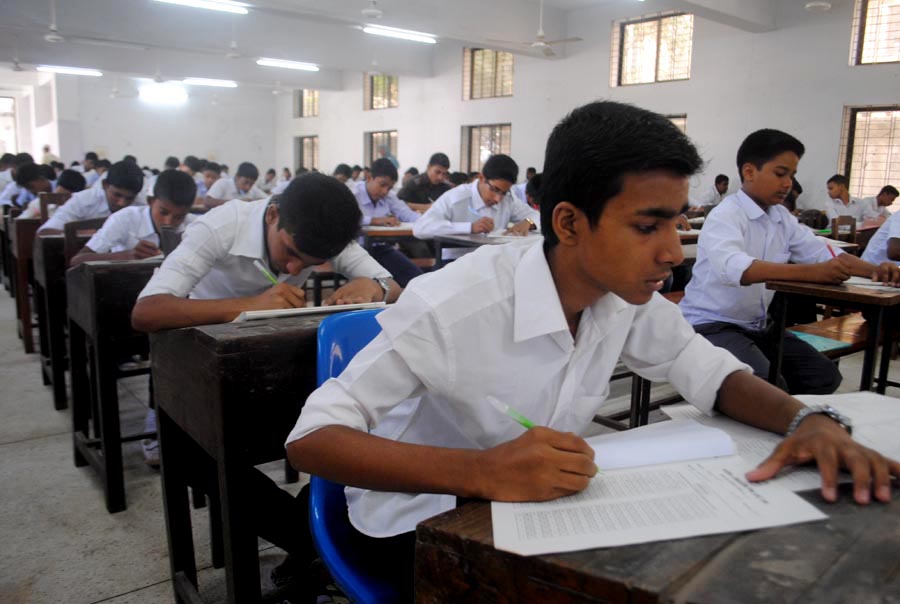

Bangladesh has finalised a new student evaluation system for the new curriculum where a student's performance will be assessed based on seven proficiency levels instead of a conventional grading system.
According to the new evaluation structure, 65 per cent of the assessment will be based on written tests, and 35 per cent will be based on practical activities.
The report cards will show the public examination results and their formative assessment separately, reports bdnews24.com.
National Curriculum and Textbook Board (NCTB) Chairman Prof Md Moshiuzzaman discussed the new evaluation framework with bdnews24.com.
"The evaluation period for a subject will be a maximum of five hours. We call it a school day because that's how people think of it. But children spend six hours in school every day."
According to Prof Moshiuzzaman, the seven proficiency levels that will be used to evaluate the students are Ananya (Unique), Arjanmukhi (Achievement-oriented), Agragami (Pioneering), Sakrio (Active), Anushandhani (Inquisitive), Bikashman (Developing), and Prarambhik (Preliminary).
The evaluation system was drafted by the NCTB back in February.
Although it was initially decided that there would be no written examination, the NCTB later formed a coordination committee for the evaluation system and curriculum after facing pressure from parents.
The final draft of the NCTB's evaluation strategy was presented at the Ministry of Education on Jul 1. Education Minister Mohibul Hassan Chowdhoury was also present during the NCCC meeting.
According to Prof Moshiuzzaman, a few changes have been made to the draft of their evaluation strategy before it was finalised.
The lowest proficiency level that will be awarded to a student is 'preliminary.' The proficiency level before that is 'developing.' When a student has been awarded 'developing,' cell number 2 will be filled out. In the same way, if a student is awarded 'inquisitive,' cell number 3 will be filled out. If a student is extremely competent, he or she will be awarded 'unique.'
"The cell numbers will be filled out based on the student’s results. Now, if I say my child is 'achievement-oriented,' people may not understand it. To eliminate this confusion, the assessments will be made using the English alphabet. The highest scale, which is 'unique' will mean the student has performed at the highest level of proficiency in all of the subjects. If they are awarded 'preliminary,' then they are achieving the lowest level on the proficiency scale," Prof Moshiuzzaman said.
Since there is no question of marks, there will be no grade points awarded, said the NCTB chairman.
He further added: "Evaluation will be based on the statement. If someone gets a 'unique' assessment in school but is awarded 'pioneering' in the collective, then it will be understood that his or her performance at school had an impact. Only then can it be challenged."
Additionally, if a student fails in two subjects, he or she will still be allowed to sit for the SSC examination.
"So if a student gets 'developing' in two subjects, they can take the SSC exam. But if they get 'preliminary,' then they won't be able to sit for it. If a student has been awarded 'developing' or below in three subjects, he or she will fail. They will also fail if they get 'preliminary' in two subjects.”
"The student will be allowed to progress to Class XI if he or she has 70 percent in attendance, 'developing' in two subjects, and has completed her assessment for at least one or two subjects," Prof Moshiuzzaman said.
However, if a student is admitted to Class XI but fails to pass two subjects, then the student will not be allowed to appear for the HSC exams. They will pass when they are awarded the next proficiency level, which is 'inquisitive."
According to Prof Moshiuzzaman, there will be no selective exams before the SSC exams. But the children have to have a 70 percent attendance in class after admission to Class X. Otherwise, they will not be able to sit for the SSC exam.
Following earlier precedents, the SSC examinations will be held under the education board. The subjects of the new curriculum will be evaluated based on the implementation of the new rules.
Last year, the new curriculum was implemented at the secondary and primary levels. In the first year, it was implemented in Classes I, VI, and VII. This year II, III, VIII, and IX are also following the new curriculum.
In 2025, all students will study under the new curriculum. In 2027, the new curriculum will be implemented in Class XII (higher secondary) as well.


 For all latest news, follow The Financial Express Google News channel.
For all latest news, follow The Financial Express Google News channel.